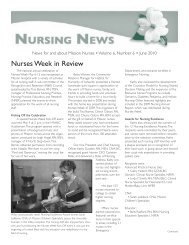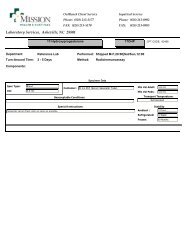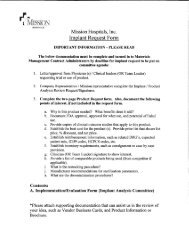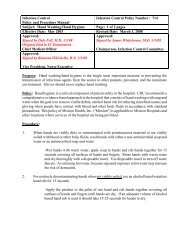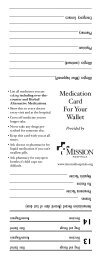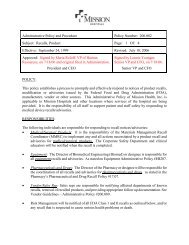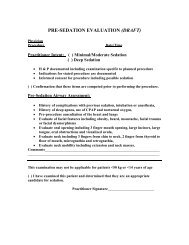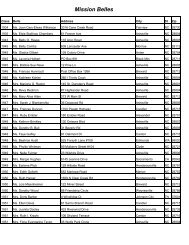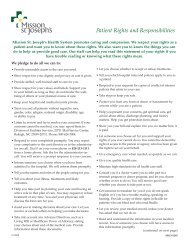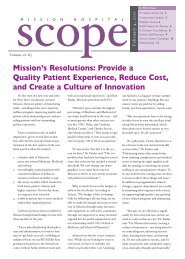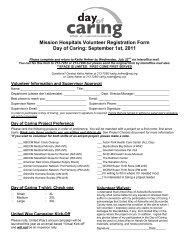New Beginnings: Pregnancy Guides - Mission Health
New Beginnings: Pregnancy Guides - Mission Health
New Beginnings: Pregnancy Guides - Mission Health
Create successful ePaper yourself
Turn your PDF publications into a flip-book with our unique Google optimized e-Paper software.
Ultrasound<br />
The ultrasound machine uses sound<br />
waves to make pictures of the baby.<br />
Ultrasound can help set your due date<br />
when it is done in the first trimester. It<br />
can look at your baby’s growth and the<br />
placenta. It can also see how many<br />
babies are in your uterus. There is no<br />
radiation used with ultrasound.<br />
WARNING S IGNS<br />
Call your doctor or midwife if<br />
any of these things happen:<br />
• Bright red vaginal bleeding like a<br />
menstrual period (You might have<br />
spotting after a vaginal exam, vaginal<br />
ultrasound or intercourse. A small<br />
amount of blood after these events<br />
is normal.)<br />
• Sharp abdominal pain with your uterus<br />
becoming very hard (Talk with your<br />
care provider about sharp pain low in<br />
your belly that might be tightening of<br />
ligaments that hold your uterus. This<br />
is not a warning sign.)<br />
• Leaking or gushing of fluid from<br />
your vagina<br />
• Sudden swelling of hands and face<br />
• Changes in vision (blurred or dark<br />
spots in front of your eyes)<br />
• Severe headache<br />
• Being very dizzy<br />
• Swollen, red, painful area on the leg<br />
(especially the calf area)<br />
• Pain or burning when you urinate<br />
• Itching, burning, or pain in the<br />
vaginal area<br />
• Vaginal discharge with a strong odor<br />
• Fever higher than 100.4 (taken by<br />
mouth)<br />
• Vomiting for 24 hours or urine that is<br />
dark yellow or orange<br />
B ABY<br />
At the end of the first month your baby<br />
is smaller than a grain of rice. In the next<br />
two weeks many of the baby’s organs<br />
(brain, spinal cord, heart, intestines,<br />
and stomach) begin to form. The head<br />
and body begin to form. The heart<br />
begins to beat about the 25th day<br />
after conception.<br />
By the end of the second month, the<br />
baby begins to look more like a human.<br />
From the top of the head to the bottom<br />
of the buttocks your baby is about<br />
1 1 /4 inch long. Your baby weighs the same<br />
as an aspirin tablet. Arms, hands, fingers,<br />
and legs are forming. Most of the<br />
internal organs are completely formed.<br />
Eyelids are formed and sealed shut.<br />
The middle ear is forming for both<br />
hearing and balance. The head is large<br />
compared to the rest of the body. The<br />
baby is beginning to move.<br />
At the end of the third month, your<br />
baby is 2 1 /2 to 3 inches long and weighs<br />
about 1 /2 ounce. The body organs are<br />
starting to work. Blood is flowing<br />
through veins and urine is being formed<br />
in the kidneys. Muscles are growing and<br />
movements of the arms and legs are<br />
more frequent. Sex organs are formed<br />
but it is still hard to tell the sex of the<br />
baby.<br />
FATHER/PARTNER<br />
It is normal for you to have many feelings<br />
at this time, just like mom. Feeling<br />
excited, nervous, and afraid all at once<br />
is normal. Mom will be getting a lot of<br />
attention and you may feel “left out.”<br />
A very good way to feel involved and<br />
important is to go to prenatal visits<br />
with mom. Read about pregnancy with<br />
her. Ask her about how she’s feeling and<br />
what’s happening to her body.<br />
Mom will need and want to “lean on<br />
you” for support and encouragement.<br />
Sometimes the best way to support is<br />
to “just listen.” Women cope with<br />
change and stress by talking about it.<br />
You won’t always have to fix the stress<br />
by doing something. Listening may give<br />
her what she needs.<br />
You might see mom acting a little strange<br />
at times. One minute she is laughing<br />
and joking, the next minute she is crying<br />
and afraid. One minute she is feeling<br />
sick and the next minute she’s eating a<br />
full meal. This is normal in pregnancy<br />
even though it might not make any<br />
sense to you.<br />
Our weekly e-newsletter is part of the educational offerings here at <strong>Mission</strong>. These<br />
emails include research findings about pregnancy, health and wellness, as well as<br />
newborn care, child development and breastfeeding. You can also email questions<br />
or comments to a staff person here at <strong>Mission</strong>.<br />
Visit theparentreview.com/missionhealth to sign up.<br />
• A change in the kicks and movements<br />
of your baby<br />
3



